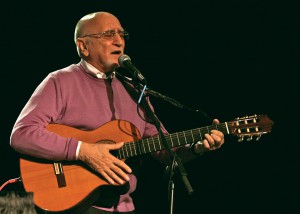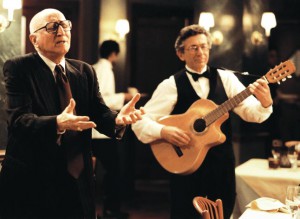By Jennifer Sellers

In a moving, mellow voice, a baritone sings a haunting Italian ballad of unrequited love. Everyone in the room sits silently, drifting away into their own bittersweet memories. The tragic beauty of the performance causes many to shed a tear.
This describes a popular scene from the season three finale of The Sopranos—perhaps one of the most memorable scenes in the series’ entirety. “Core ‘ngrato,” translated into English as “The Ungrateful Heart,” was performed by the character of Corrado “Uncle Junior” Soprano, played masterfully by actor Dominic Chianese. But this same scene could just as easily describe performances by Chianese at any number of senior centers and communities in the New York City area.
Long before Chianese’s musical talent was broadcast across America, he brought it to New York’s elderly citizens.
‘My First Love’
Bronx-born Chianese has been a singer even longer than he’s been an actor. The 77-year-old has been performing music since his teenage years. “I eventually got into theater, but music has always been my first love,” he says. “I grew up with role models like Bing Crosby and Frank Sinatra, and I loved listening to some of the opera greats of the ’30s,” he says. As a second-generation Italian American, Chianese also learned many traditional Italian songs from his father and grandfather—songs he still sings to this day.
When Chianese says he loves music, he doesn’t just mean the music he grew up listening to; he means “all types of music.” It might surprise many to know that Chianese, a native New Yorker, has a special appreciation for Country music. In fact, he has even performed at the Grand Ole Opry in Nashville. “I’m probably the only person who has ever sung in Italian at the Grand Ole Opry,” jokes Chianese. While he did perform in Italian, he also sung the classic Country standard “A Fool Such As I.” “I love Country music,” says Chianese. “I guess you could just say that I love music—all of it.”
While music has always been an important part of his life, Chianese is better known to the general public as an actor. For decades, he has acted in theater, and on the big and small screens. He even had a role in Francis Ford Coppola’s Oscar-winning The Godfather: Part II. It was The Sopranos, however, that made him a recognizable face. But even as his success in acting continued, Chianese never abandoned his first love. He continued to perform regularly with his band, the New York Sidewalkers, and recorded two albums: Hits and Ungrateful Heart.
Chianese’s real-life musical talents were also incorporated into his performance of Uncle Junior on The Sopranos. “Chase really knows how to pull out the talents of his cast and put them to use for the characters and the plots,” Chianese says of David Chase, creator of the multiple award-winning The Sopranos.
Mixing Music and Memory
Chianese doesn’t just perform for the love of making music. He believes in the power of music. He’s seen it in his own life and he’s witnessed it in others, he says. As a result, an important part of Chianese’s life has become his low-key performances at senior centers and retirement homes in his area.
“In 1981 I got back to my spiritual roots,” he says. “I wanted to adopt a lifestyle of doing for others and using music to heal.” As an effect of this turnaround, Chianese started visiting and entertaining senior citizens. He has continued this volunteer work for 25 years.
Chianese primarily visits senior facilities in the New York City and Westchester County areas. While his singing has always been popular among the senior citizens he visits, his Sopranos stardom has added an element of excitement to his performances for many of them. “To them, I was always ‘just Dominic,’” he says. “Now, I’m ‘Dominic from TV.’
“But it has always just been me and an acoustic guitar,” he continues. “The songs I sing are the songs these people grew up with. You can see in their eyes the happiness—and sadness—this music can bring. It brings memories.”
Chianese says that music has the same effect on him, bringing up memories of his parents and grandparents. “Performing for senior citizens is important to me now,” he says. “I’m a senior citizen, too.”
Remembering “Stardust”
Throughout his years of volunteering his musical talents, Chianese has noticed that even people with dementia seem to react to certain songs. He recounts a particular performance where a woman with Alzheimer’s disease, who was completely unresponsive before and after his performance, was able to sing along when he got to “Stardust.”

Chianese’s observation isn’t unusual. According to Concetta M. Tomaino, DA, MT-BC, director at The Institute for Music and Neurologic Function and vice president for music therapy at Beth Abraham Health Services in New York, in her research presentation, The Role of Music in the Rehabilitation of Persons with Neurologic Diseases: Gaining Access to “Lost Memory” and Preserved Function Through Music Therapy, “memories are not actually lost with dementia or with other brain injuries; rather, the ability to retrieve and gain access to these is damaged. Music, then, can provide access not only to specific moods and memories, but also to the entire thought-structure and personality of the past.”
In a clinical study conducted by Tomaino, persons with medium to late-stage Alzheimer’s were able to verbalize information from their past when listening to music of their personal preference. “One of the participants, Molly, who was non-verbal at the beginning of the music therapy intervention, began to speak after hearing an Irish tune repeated for the third time,” says Tomaino in the study. “Although she only stated ‘That’s nice,’ it was the first coherent remark she had made. At that point the therapist asked Molly where she was from and she replied ‘from Ireland’ and then continued to talk about her family and what a nice town it was. Even though the phrases were fragmented, the images and ideas Molly was trying to present were clearly connected.”
Fascinated by the connection between music and memory, Chianese himself began reading the latest studies on the topic. He educated himself on these matters not just as matter of personal curiosity, but to also improve his understanding of the people he performed for.
The Most Important Role
Chianese’s exposure to people with Alzheimer’s disease and dementia may have helped him out in his other job—his Emmy-nominated role on The Sopranos. His understanding of Alzheimer’s based on observations of those he had known with it helped inform his portrayal of a person with dementia. By the final season of The Sopranos, Chianese’s character, Uncle Junior, began showing significant signs of dementia. A diagnosis of Alzheimer’s disease was never mentioned as the cause of Uncle Junior’s dementia, but it was implied.
“He was someone with a lot of shallowness and intolerance,” says Chianese of Uncle Junior. “But he also had a very vulnerable sense of himself… I think it [his dementia] made him softer to viewers.”
Unfortunately, Uncle Junior’s dementia, much like the rest of his life, was punctuated by violence and darkness. But off-screen, Chianese is bringing light to people through his music.
Now that The Sopranos has concluded, Chianese hopes to devote more time to his music—perhaps recording another album and more touring with his band. He also continues performing for New York’s senior citizens. “I believe a community can only be as good as the individuals in it,” he says of his belief in volunteerism.
As for Chianese’s next big role: “The part I’m working on now is being Dominic,” he says. “I’m working on my music and my personal growth.”
Source: www.ALZinfo.org. Author: Jennifer Sellers, Preserving Your Memory: The Magazine of Health and Hope; Spring 2008.










